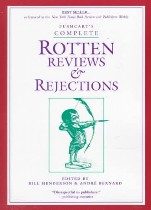 Bill Henderson & André Bernard •
Bill Henderson & André Bernard •
Rotten Reviews & Rejections •
Every one of today’s literary giants was once blasted by devastating comments from a reviewer or publisher. Every best-seller was sneered at by someone; every masterpiece got rejected.
You could take this to mean one of several things: that editors and critics are doofuses, incapable of recognizing genius when it bites them on the ankle; that it was just as hard to get published 100 years ago as it is today; that few people can resist the urge to denigrate.
But I suspect the purpose of this book was more basic—to console fledgling authors whose work is being disparaged or dismissed. One way or another, it makes for vastly entertaining reading.
A few of the critiques leveled at now-famous books and writers:
Sanctuary, William Faulkner: “Good God, I can’t publish this. We’d both be in jail.”
And to Think That I Saw It on Mulberry Street, Dr. Seuss: “Too different from other juveniles on the market.”
A Remembrance of Things Past, Marcel Proust: “I can’t see why a chap should need thirty pages to describe how he turns over in bed before going to sleep.”
Charles Dickens: “We do not believe in the permanence of his reputation.”
Alice in Wonderland, Lewis Carroll: “Stiff, overwrought story.”
The Great Gatsby, F. Scott Fitzgerald: “Falls into the class of negligible novels.”
The Spy Who Came In from the Cold, John le Carré: “You’re welcome to le Carré—he hasn’t got any future.”
Wuthering Heights, Emily Brontë: “It will never be generally read.”
Anna Karenina, Leo Tolstoy: “Sentimental rubbish.”
Rudyard Kipling: “I’m sorry, Mr. Kipling, but you just don’t know how to use the English language.”
The bottom line: If you’re wallpapering your apartment with rejection slips—as Scott Fitzgerald was said to do—you’re in good company.





Your email address will not be published.